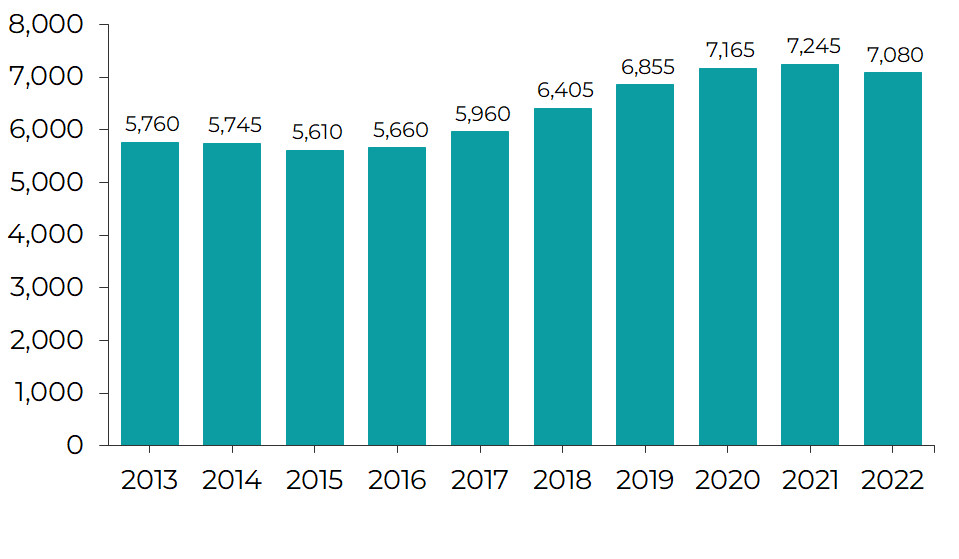This is the second in our series of articles reflecting on the Welsh Government’s progress against its Programme for Government (PfG). It explores the well-being objective to “Protect, re-build and develop our services for vulnerable people”.
There are 14 specific commitments beneath this broad Cabinet-wide objective, which the Welsh Government has given an update on in its PfG annual report. There are also relevant Ministerial commitments.
Browse our full #ProgrammeforGovernment series, published to date.
People are living longer and with chronic conditions. More children are coming into state care. This is all against the backdrop of two significant challenges for social care: the fragile workforce, coupled with the impact of the rising cost of living.
Here, we discuss the 14 Programme for Government (PfG) commitments under this objective and consider some of the broader social care policy context within which these commitments exist.
Care experienced children
More than one child in every hundred in Wales is in care and has the ‘state’ acting as their parent. A quarter of children in care have lived in two or more placements within the past year. Fewer, than one in five children in care get 5 or more GCSEs at grades A*-C, including Maths and English or Welsh. Some are placed in illegal or unregistered placements, others go missing or are subject to a ‘deprivation of liberty order’ for welfare reasons or risks to their safety. Many care leavers become homeless and the Petitions Committee found that around a quarter of care experienced young people have one or more of their own children removed by the state.
The Welsh Government has made multiple PfG commitments in this policy area. The Children, Young People and Education (CYPE) Committee has considered whether these are the right priorities for ‘radical change’, when set against a backdrop of rising rates of children in care and the financial pressures on health and social care.
Numbers of children looked after in Wales

Source: StatsWales Children looked after at 31 March by local authority, gender and age
PfG commitments in this policy area include funding advocacy for parents of children at risk of coming into care, with £1.6m allocated over four years. However, longer term funding for this work is yet to be confirmed and there may be competing financial priorities. For example, the Basic Income Pilot for care leavers, which supports young people leaving care through a monthly income of £1,600 for two years, has cost £5m since April 2022. The Welsh Government has also allocated £68m to remove profit from the care of looked after children, in line with a PfG commitment. It’s invested in accommodation for children with complex needs, and refers to 19 residential and 5 emergency, respite, or transitional schemes.
During this first week of term, on 14 September, the Deputy Minister for Social Services will face renewed scrutiny from the CYPE Committee to account for the PfG commitment to “explore radical reform of current services for children looked after and care leavers”. This follows on from the final Plenary debate of the summer term where some Members expressed disappointment with the Welsh Government’s response to the CYPE Committee report. It had concluded that PfG commitments are not radical enough, and said:
Anybody claiming that the state is doing its corporate parenting job well should consider whether they would be happy for their own child to be cared for by that system.
Childcare and early years
The original beneficiaries of the Childcare Offer for Wales were working parents but, following criticism, the Welsh Government put in place a PfG commitment to “Fund childcare for more families where parents are in education and training or on the edge of work”. Parents of 3 and 4 year olds enrolled in further or higher education can apply for 30 hours childcare for 48 weeks of the year. This has supported an additional 438 families and made an estimated 3,000 more eligible.
The PfG has a separate commitment to expand free childcare to all 2 year olds. The Welsh Government says the expansion has led to more than 2,500 additional beneficiaries so far. Over the next two years £46m will be used to expand the scheme further, with the aim of funding childcare for 4,500 more 2 year olds in 2023-24 and “a further 5,200” in 2024-25. The PfG commitment to continue Flying Start, an early years programme which also includes free childcare, is underway. £83m was invested in 2022-23, with over 38,500 children under 4 years old currently receiving at least one of the four elements of the programme.
Comparisons have been made between the free childcare offers in Wales and England. This follows a commitment by the UK Government earlier in 2023 to provide free childcare to children of eligible working parents from the age of 9 months by 2025. However, the First Minister has rejected criticism, saying:
…what we see is an attempt in England to catch up with services that are already available here in Wales. It's quite certainly not the other way around.
The social care workforce
There are unprecedented staffing shortages and pressures in social care. Significant vacancies have led to a reliance on expensive temporary staffing arrangements. Half of all children’s social care posts are covered by agency staff, and 84% of those staff are covering qualified social worker posts.
Our article “Social Care: a workforce in crisis?” sets out the huge challenges facing adult social care. Severe staffing shortages are causing long waiting lists for assessments, care services and care reviews. Homecare packages often aren’t available when people need them, meaning many hospital patients who are medically fit to leave are unable to be safely discharged home.
The Welsh Government has fulfilled its PfG commitments to pay care workers the Real Living Wage; and (working with the Fair Work Forum) to “consider further steps towards parity of recognition and reward for care workers”. It’s less clear whether progress has been made in increasing apprenticeships in care and in recruiting more Welsh speakers.
Implementation of the Real Living Wage began in April 2022, and was welcomed by many as a first step. However, stakeholders, including Trade Unions and care providers, have said this move alone is not enough to address the shortages. In January, the Deputy Minister noted that wages are “still not enough to really compete”, and that pay, terms and conditions need to improve further. The Health and Social Care (HSC) Committee found it’s not clear whether recruitment campaigns like WeCare Wales have been successful.
The Social Care Fair Work Forum was established in September 2020. It published a progress update in 2023 setting out plans for a voluntary model of collective bargaining to improve parity on terms and conditions, and a voluntary pay and progression framework which the Welsh Government recently consulted on.
In February, the HSC Committee said it wasn’t yet persuaded that the Fair Work Forum’s work is being progressed at the pace needed; or that voluntary measures for collective bargaining or pay structures are adequate to address the severity of the situation.
A national care service
The Welsh Government has met its PfG commitment to establish an expert group to advise on the practical steps towards delivering a National Care Service free at the point of need. The Co-operation Agreement added to this, including a commitment to agree an implementation plan for a National Care Service by the end of 2023.
The expert group was established in February 2022 to advise on the key elements necessary for creating a National Care Service. The Welsh Government published the group’s report in November 2022.
In May 2023, the Welsh Government launched a consultation on proposals for both a national commissioning framework and a national office for care and support. The Deputy Minister described these as “amongst the first important building blocks of a national care service”.
But big questions remain about how a National Care Service (free at the point of need) could be funded, and when this might become a reality. The Deputy Minister says the Welsh Government will be looking at funding options, but because of the present financial situation, it “can't give any commitment as to when we'll actually be able to do that”.
Delivering the right priorities for ‘vulnerable people’?
Many other commitments across the PfG will impact on ‘vulnerable people’, for example the commitments to “provide effective, high quality and sustainable healthcare” and those to “eliminate inequality in all of its forms”.
The Annual Report acknowledges that PfG Commitments are set against a “deepening cost-of-living and cost-of-energy crisis”, saying:
Protecting and supporting the most vulnerable people in society is at the heart of our work. This has been particularly important during this cost-of-living crisis as so many people have experienced hardship.
Our previous articles explain the “cost of operating challenge” facing the sector and how the cost of living affects unpaid carers and domiciliary care. NSPCC Cymru have already raised concerns that increasing hardships may increase the numbers of children coming into the social care system, saying:
Poverty has been described as ‘the wallpaper of the social care system’, in that is it is too big to tackle and too familiar to notice.
Looking ahead to the autumn term, the Equality and Social Justice Committee will be considering this ‘bigger picture’ for the social care system when it examines the Welsh Government’s approach to the Draft Child Poverty Strategy for Wales 2023.
Explore the Programme for Government, its objectives and commitments
- 1. Provide effective, high quality and sustainable healthcare
- 2. Protect, re-build and develop our services for vulnerable people
- 3. Build an economy based on the principles of fair work, sustainability and the industries and services of the future
- 4. Build a stronger, greener economy as we make maximum progress towards decarbonisation
- 5. Embed our response to the climate and nature emergency in everything we do
- 6. Continue our long-term programme of education reform, and ensure educational inequalities narrow and standards rise
- 7. Celebrate diversity and move to eliminate inequality in all of its forms
- 8. Push forward towards a million Welsh speakers, and enable our tourism, sports and arts industries to thrive
- 9. Make our cities, towns and villages even better places in which to live and work
- 10. Lead Wales in a national civic conversation about our constitutional future, and give our country the strongest possible presence on the world stage
Article by Sian Thomas and Amy Clifton, Senedd Research, Welsh Parliament






